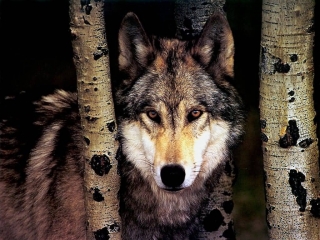The Truth About Wolf Extermination

Our fear and hatred of the wolf begun much after its domestication, when humans took the first step to distance themselves from nature, to enslave nature and to exploit it—it happened when we invented agriculture. In the beginning, there were only some skirmishes provoked by the occasional domestic animal taken by a wolf. The wholesale extermination of the wolf is not due to a single factor, but to an intermingled combination of factors, i.e. mythology, religious zeal, environmental changes and economic incentives; and a deep psychological scar, as we shall see. Mythology, comprising Grimm's fairy-tales and Aesop's fables, picture the wolf as evil, tricky, conniving, coward, a greedy thief that will go to great lengths to eat a poor little lamb, children and old people. Tales of werewolves exacerbated our fear and hatred of the wolf. Religious convictions support our hatred of the wolf beginning with God himself, "Then God said, 'Let us make man in our image, after our likeness; and let them have dominion over the fish of the sea, and over the birds of the air, and over the cattle, and over all the earth, and over every creeping thing that creeps upon the earth.'" (Genesis 1:26-29). European farmers and American settlers were devout Christians and they didn't need a more clear incentive to declare war on all that creeped upon the Earth. "Be fruitful and multiply, and fill the earth and subdue it; and have dominion over the fish of the sea and over the birds of the air and over every living thing that moves upon the earth." (Genesis 1:26-29) -- and the wolf became the ultimate target and the symbol of their mission. Farming and keeping domestic animals stationary and corralled combined with the decimation of the natural prey of the wolf, forced the wolf to get closer to human settlements and to feed upon the occasional livestock. Most wolves today avoid our livestock when they have enough wild prey, but the wolves of the 1800s faced extreme food shortages and preyed upon cattle and sheep. For rich farmers this wasn't a problem at all and even the smaller family farms could have survived, even though with some economic loss. Nevertheless, governments created and implemented bounties for the head of a wolf. Besides shooting wolves, wolf hunters used traps, poison, denning (excavating a den and killing the cubs) and biological warfare (infecting captive wolves with sarcoptic mange and releasing them into the wild)--and wolfing became a lucrative business. Mythology, religious zeal and economy explain a lot, but not the whole of it. One thing is to control competition (it happens all the time in nature), another is to embark on a radical extermination and even find reward in the practice of torturing (like setting wolves on fire, skinning them alive, hanging them, etc.), which suggests that the real reason for our hatred toward the wolf is well hidden and maybe closer to us than we care to believe or dare to face. Human evolution happens as the evolution of all other organisms, quietly and slowly unless some sudden environmental change of large proportions prompts the selection of unusual traits. The human brain was the sudden single factor of large proportions that prompted a huge leap in the evolution of the species—and it was not an external factor, it came indeed from deep within us. The human brain enabled first the ability to devise farming, then science and technology, and finally an anthropocentric religion. Farming enabled us to multiply much beyond normal rates until then and to colonize the whole world. Advancements in science and technology gave us the tools to subdue all life on the planet. Religious convictions provided us with the motive and the momentum beyond all rationality. There is a high price to pay when evolution equals revolution. The (relatively) quick adoption of dualism and a mechanistic view of the world forced us to part with holism and animism, and left us with deep scars. To obey God, conquer the world and subdue all that creeped upon our planet, we had to sever all connections with the natural, unruly, uncivilized world. All that reminded us of our holistic past had to be oppressed, suppressed, forgotten. The wilderness in general and the wolf in particular reminded us of our true nature, the very same nature we despised. We had to subdue our own wild side, the wilderness in us, a legacy of our many million years old ancestors, which had proved highly efficient, yet despised and denied by the Holly Church. Religious zeal imprinted and encouraged in us the need to combat the symbolic wild wolf inside each one of us. A conflict of identity was inevitable, the werewolf representing maybe our struggle to switch from the organicist to the mechanistic world view. While the dog represents what we want to be, the wolf stands for what we don't want to acknowledge as part of ourselves. The dog represents control, reminds us of our power, is a testimony of our ability to tame the wild. The wolf is our guilty consciousness, reminds us of our humble origins, represents the freedom we gave up, the togetherness we abandoned. Aesop contributed in his fables to the creation of many myths detrimental to the image of the wolf by depicting it with all the characteristics we despise most. Unknowingly, hence most ironically, in one uncharacteristic fable, he uncovers accurately and in a few words our secular-long conflict. In "The Dog and the Wolf," the dog invites the starving wolf to live with him and his master, but when the wolf discovers that it will imply being chained, the wolf replies "Then good-bye to you Master Dog. Better starve free than be a fat slave." We became the fat slaves by our own choice; and the wolf reminds us too well that we once had other options. So, who are we fighting? I'd say that we never fought the wolf, never the enemy, we have always fought ourselves—and the enemy within us. As long as we will remain in denial of our inheritance, the scar won't heal and the enemy will remain well entrenched within us—and so will we keep fighting the wolf.
Read more at http://rogerabrantes.wordpress.com.




